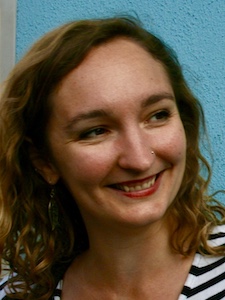-

Amanda Martin Sandino
Lecturer
Email: amartins@ucsd.edu
Office Location: HSS 2041Fall Quarter 2025
CGS 2A: Introduction to Critical Gender Studies: Key Terms and ConceptsCGS 113: Gender & Sexuality in the Arts
CGS 187 / ETHN 187: Latinx SexualitiesWinter Quarter 2026
CGS 116: Feminist Social Movements
CGS 124: Girls and SexualityCGS 137 / ETHN 137: Latina Issues & Cultural ProductionSpring Quarter 2026CGS 121: Selected Topics in CGSCGS 122: Advanced Topics in Comparative PerspectiveCGS 128: Transnational FeminismsResearch Interests and Education
A second-generation Chilenx American, Amanda Martin Sandino is a scholar of disability, gender, race, and futurity. She received her Ph.D. in Literature and MFA in Writing from UC San Diego, her MA in Cultural Studies from UW Bothell, and her BA in Asian Studies from Seattle University. Her first book, Looking Beyond the Curtain: Disability Futurity and the Literary Wonderland, is scheduled for publication by McFarland Press in 2021. -

Leila Whitley
Continuing Lecturer
Email: lwhitley@ucsd.edu
Office Location: HSS 2041Fall Quarter 2025 & Winter Quarter 2026
On leave of absence
Spring Quarter 2026
CGS 100B: Conceptualizing Gender: Methods
CGS 105: Queer Theory
CGS 106: Gender & the LawResearch Interests and Education
Leila Whitley’s research interests include feminist and queer theory, critical race feminisms, and the relationships between borders and bodies. She completed her PhD in Cultural Studies at Goldsmiths, University of London, her MA in Cultural Studies also at Goldsmiths, and her BA at McGill University. From 2016-18 she was a Marie Curie Postdoctoral Fellow at the Zukunftskolleg of the University of Konstanz, Germany, and before this was based in the Centre for Feminist Research at Goldsmiths, University of London. -

Marisol Cuong
Lecturer
Email: mcuong@ucsd.edu
Office Location: HSS 2041Fall Quarter 2025CGS 109: Sexual ViolenceCGS 110: Intersectional Struggles for Environmental JusticeWinter Quarter 2026CGS 2B: Introduction to Critical Gender Studies: Social FormationsCGS 101: Gender and Globalization
CGS 111: Gender & the BodySpring Quarter 2026CGS 114 / ETHN 183: Gender, Race, Ethnicity, & ClassCGS 123: Gender & Reproductive PoliticsCGS 127: Feminist Border StudiesResearch Interests and Education
Chicana/o Latine gender and migration, displacement, and militarization. Marisol received her Ph.D. in Literature (Spanish Section) with Critical Gender Studies Specialization, as well as M.A. in Literature, from UC San Diego. -

(Errol) Tsekani Browne
Lecturer
Email: etbrowne@ucsd.edu
Office Location: SSB 242Winter Quarter 2026
CGS 125: Women of Color WritersResearch Interests and Education
Raised in San Diego, (Errol) Tsekani Browne has taught Ethnic/Gender Studies and history courses for nearly two decades at schools in California, Pennsylvania and Maryland. He earned his BA and MA in African-American Studies from UCLA, along with a PhD in History (African-American, United States, Gender fields) from UCLA as well. His research focuses on social constructions of race/gender, the intersections of feminism/nationalism, and racial/gender violence. Tsekani began teaching in UCSD’s Ethnic Studies Department in 2021. His current book manuscript--an intellectual history of Anna Julia Cooper—reads Cooper’s life and work, paying particular attention to the ways Black women intellectuals deployed constructions of race, gender and nation, and constructed intellectual community in relation to feminism, progressivism, pan Africanism, civil rights and Black nationalism. He is also interested in further researching shifting notions of Black masculinity. Tsekani has presented dozens of papers in the United States and Europe, including at the annual meetings of the American Historical Association (AHA), Organization of American Historians (OAH), Southern Historical Association, Association for the Study of the Worldwide Diaspora (ASWAD) and the Association for the Study of African-American Life and History (ASALH), among others. Besides teaching, Tsekani hopes to become more involved in the institutionalization of ethnic studies, bridging gaps between “campus” and “community,” and social justice efforts locally.
